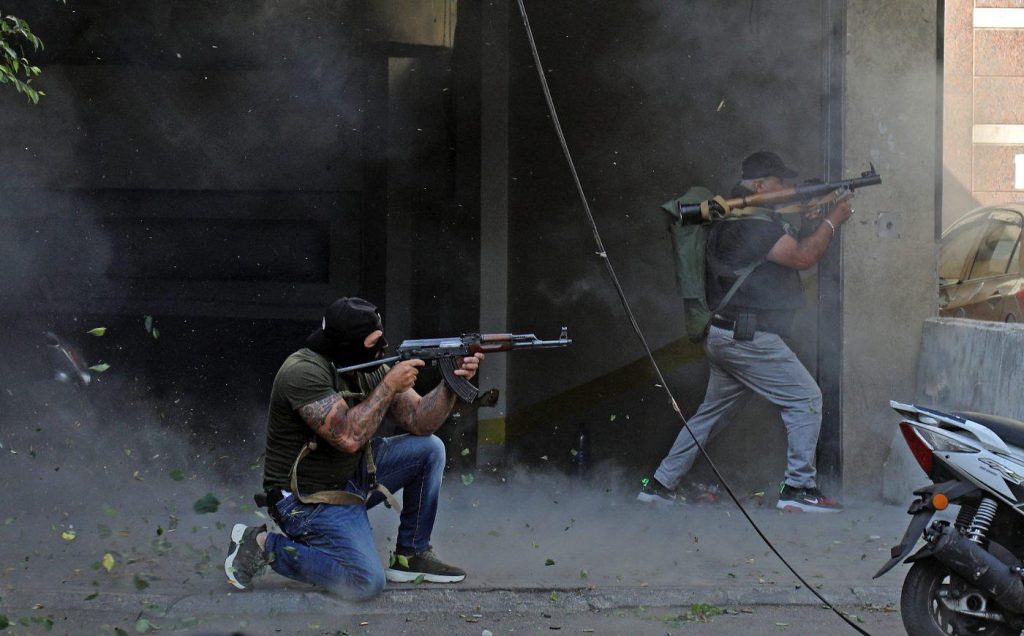This Thursday, the Shi’a Muslim political-military group Hezbollah and its ally Amal, which is also Shi’a, organized a demonstration at the Beirut Palace of Justice to demand the replacement of judge Tarek Bitar, who is heading the investigation into the double explosion at the port of Beirut in August 2020. This explosion killed some 220 people and injured more than 7,500, and destroyed a major part of the city. The Shiite organizations are accusing the judge of initiating a “political” investigation after he issued an arrest warrant for Amal leader Ali Hassan Khalil.
The situation quickly intensified when shots were fired at the demonstrators. Hezbollah claimed they were snipers. More than three hours of violent clashes followed in the city’s center. Reports indicate at least six were killed and several dozen people were injured. Photos on social media are striking showing exchanges of automatic weapon and even rocket fire. Panic spread through Beirut neighborhoods, with many people trying to flee and protect themselves and children who were sheltered in schools.
The investigation combines many political issues. Everyone in every Lebanese government over many years were aware that dangerous cargo was being stored in the heart of this densely populated city. But in Lebanon’s delicate political context, such an inquiry is highly politicized, and thus has enormous consequences for those held responsible — all the more so since given the growing discontent among the population regarding the lack of response to the catastrophe at the port.
Both the lack of a response and Thursday’s violent clashes flow from a complex political regime that is constrained by economic, political, and even military interests of the different competing factions in power since the end of the civil war. If they are not able to come to some agreement “peacefully,” resorting to street violence and even armed confrontations will become practically inevitable. Some analysts even warn of the risk of civil war, though at the moment it’s too soon to tell.
Imperialist powers, including France and the United States, have called for calm and pleaded for “independence” and justice. This was the message of U.S. Under Secretary of State for Political Affairs Victoria Nuland, who was in the Lebanese capital at the time of the clashes. But they say nothing about truth and justice for the victims of last August’s terrible disaster. Their objective is to weaken one of Iran’s primary allies at the regional level.
But the Western allies are clearly just as corrupt and bloodthirsty as Hezbollah. In other words, it is hypocrisy on the part of powers such as France, whose government posed as guarantor and protector of the Lebanese population after the August 2020 explosion.
This situation is even more tragic in that it comes in the midst of a historic economic crisis in the country. “The economy has pretty much collapsed, and society along with it. According to the World Bank, the economic crisis Lebanon is going through right now, might be one of the top three worst economic crises the bank has had in the past 150 years,” explains Lebanon-based Nazih Osseiran of the Wall Street Journal. The Lebanese lira has effectively lost 90 percent of its value since 2019, nearly 8 percent of the Lebanese population has fallen below the poverty line, there are fuel shortages, electricity is rationed and cut off several hours a day, and inflation has soared.
The entire situation shows that the Lebanese poor and working class will find no allies among the national bourgeoisie, reactionary regional powers like Iran, or the imperialists. The corrupt regime of Lebanon is incapable of offering even the beginnings of answers to what happened in the explosion in Beirut. The responses to the port disaster, as well as to the structural problems of the Lebanese poor and working class, will arise from the ruins of this corrupt regime.
First published in French on October 14 in Révolution Permanente.
Translation by Emma Lee











